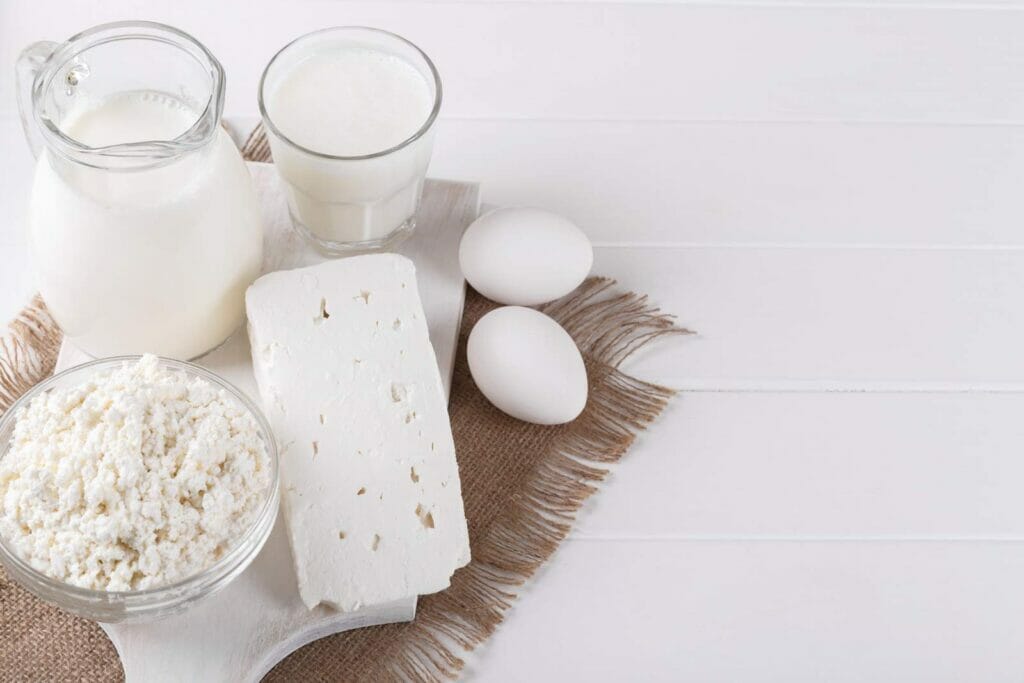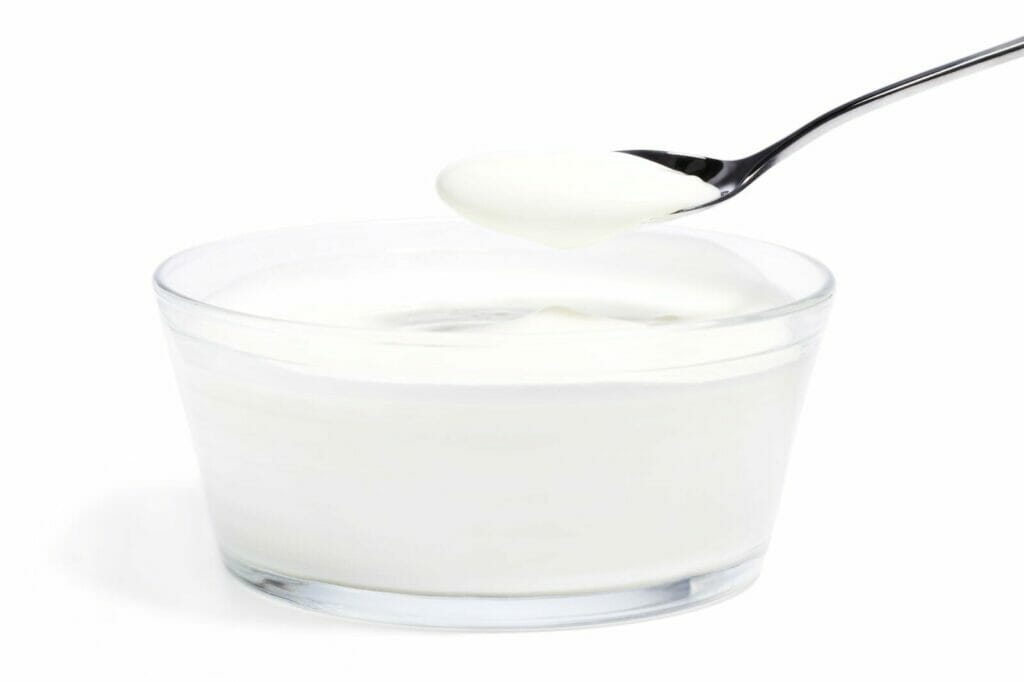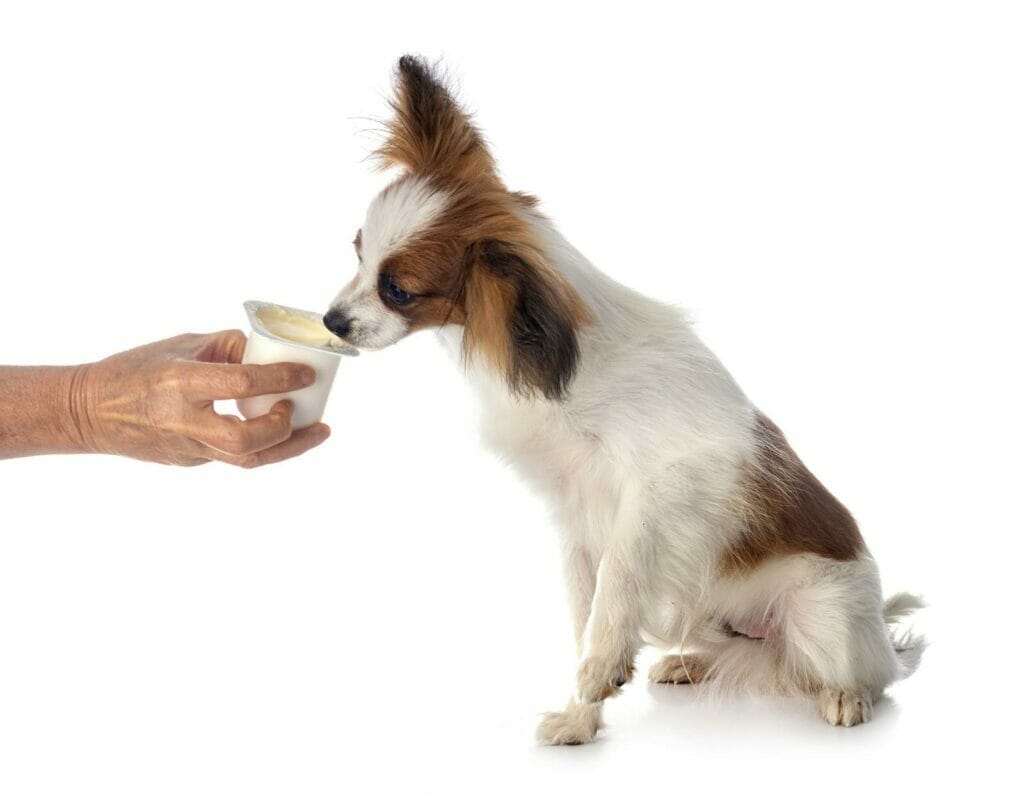Last updated: April 25, 2025
So you’re eating your favorite yogurt and your dog is wagging their tail asking you for some. Can dogs eat yogurt? Is yogurt good for dogs? The answer to both questions is yes! Almost all dogs can eat yogurt as a treat once in a while as long as they are served in a safe manner.
However, can dogs eat yogurt safely, and is yogurt good for dogs? It’s almost impossible to find a dog who doesn’t want to eat anything their owner is eating. They want what you’re having, whether it’s a hamburger, lettuce, or yogurt.
It can be challenging to resist those sweet puppy eyes, but as a responsible pet parent, you want to ensure anything you give to your pup is safe for them.
Can Dogs Eat Yogurt?
Yes, dogs can eat yogurt—but there are a few important things to consider before adding it to their diet. Yogurt is packed with probiotics, calcium, and protein, all of which can support your pup’s health. However, not all yogurt is created equal, and some varieties can do more harm than good.
When choosing a yogurt for your dog, it’s best to stick with plain, unsweetened yogurt that contains live and active cultures. Greek yogurt is often a great option because it has lower lactose levels than regular yogurt while still offering a protein-packed punch. Probiotics in yogurt can promote gut health and improve digestion, especially for dogs with mild stomach sensitivities.
However, not all dogs tolerate dairy well. Some pups are lactose intolerant, meaning they may experience gas, bloating, or diarrhea after eating yogurt. If you’re introducing yogurt to your dog for the first time, start with a small spoonful and monitor their reaction before making it a regular treat.
It’s also critical to avoid yogurts that contain artificial sweeteners, especially xylitol, which is highly toxic to dogs. Flavored yogurts, especially those with added sugars, can lead to weight gain and digestive upset. Always check the ingredient list to ensure the yogurt is safe before sharing it with your furry friend.
Ultimately, while yogurt can be a nutritious snack for many dogs, it should be given in moderation. If you’re unsure whether yogurt is suitable for your pup, consulting with your veterinarian is always a good idea.
Is Yogurt Safe for Dogs?
Yes, yogurt is generally safe for dogs, but there are a few key factors to consider before feeding it to your pup. While plain, unsweetened yogurt with live and active cultures can be a nutritious treat, not all yogurts are safe for canine consumption. The safety of yogurt depends on its ingredients, your dog’s individual tolerance to dairy, and the portion size.
Yogurt Ingredients Matter: What to Avoid
One of the biggest concerns when it comes to yogurt safety is added ingredients. Many commercial yogurts contain artificial sweeteners, flavors, and preservatives that can be harmful to dogs. In particular, xylitol, a common sugar substitute, is extremely toxic to dogs and can cause a dangerous drop in blood sugar, seizures, or even liver failure. Always check the ingredient list to ensure the yogurt is free of xylitol and other harmful additives.
Flavored yogurts, especially fruit-flavored varieties, often contain added sugars, which can contribute to obesity, diabetes, and digestive issues in dogs. High sugar intake can also lead to energy spikes followed by crashes, potentially making your pup feel sluggish. Instead, opt for plain, unsweetened yogurt to ensure they’re getting the benefits without the unnecessary additives.
Dogs And Dairy
Dairy products like milk aren’t necessary for a dog’s diet, and many dogs have difficulty digesting dairy products because they contain lactose. Some dogs can’t tolerate milk because their bodies don’t produce an enzyme called lactase, which helps digest the lactose found in milk.

After weaning, your pup’s body no longer digests lactose sufficiently, and the level of lactase activity falls to about 10% of its peak. Cow and goat milk also contains high quantities of lactose – between 4.5% to 5% – compared to dog milk (only 3.1%). Such quantities in cow and goat milk can be too high for a dog to digest.
As a result, lactose intolerance can occur if your dog consumes more lactose than they can digest, leading to various symptoms like:
- Diarrhea or loose stool
- Lack of appetite
- Vomiting
- Abdominal discomfort
- Bloating
- Cramping
- Dehydration
- Gas
Intolerance Vs. Allergy
Studies show that dairy products, beef, chicken, lamb, and wheat are the most likely food allergens to cause an adverse food reaction in dogs. While lactose intolerance involves the inability to process or digest lactose, a milk protein allergy involves an immune response to the consumption of milk protein.
Common symptoms of milk protein allergy include:
- Red and itchy skin
- Excessive scratching and licking
- Hair loss
- Frequent ear infections
- Loss of appetite
- Nausea
- Vomiting
- Diarrhea
- Difficulty breathing
- Face swelling
You can see that these symptoms are similar to those of lactose intolerance, making it difficult to diagnose the correct allergy. If your dog has an allergy to dairy products or is lactose intolerant, the discomfort caused by consuming dairy products like yogurt may outweigh the benefits.
It may be challenging to know whether or not your dog can consume dairy products until they demonstrate such symptoms. Some may display a mild tolerance, and the symptoms may be harder to spot. The only way to know for sure whether your dog can consume dairy products without issue is through a vet’s diagnosis.
Is Yogurt Good For Dogs?
Yogurt can be an excellent source of protein and calcium for your dog, and it’s a well-known source of probiotics, which are beneficial bacteria that promote gastrointestinal health.

Adding probiotics to your dog’s diet plays an essential role in keeping their immune system strong. It promotes good bacteria growth in your dog’s gut, and this, in turn, supports their gastrointestinal health. Probiotics can boost your dog’s overall health and immune function because over 90% of a dog’s immune system is in the gut.
Probiotics can:
- Produce digestive enzymes that help your pup absorb nutrients
- Protect their body against harmful viruses, bacteria, and fungi
- Act as a barrier against heavy metals, toxins, and allergens
- Help the body absorb iron, magnesium, calcium, and other nutrients
- Produce B vitamins that are essential for cellular health and metabolism
- Support brain function
- Prevent dental diseases
Yogurt also contains live cultures that are great for your pup’s digestive health. They’re beneficial for dogs on antibiotics because antibiotics can kill off the good bacteria that live in your dog’s gut. Some live culture yogurts can help return your dog’s gut flora to normal.
Since lactose intolerance is common in dogs, you have to introduce the yogurt slowly, in small amounts, to determine whether they can tolerate it.
Health Benefits of Yogurt for Dogs
When fed in moderation, yogurt offers several key health benefits for dogs, making it a nutritious addition to their diet. This dairy product is not just a tasty treat—it’s packed with essential nutrients that can support digestion, immunity, and overall well-being.
Key Benefits of Yogurt for Dogs
Rich in Probiotics for Gut Health – The live and active cultures in yogurt introduce beneficial bacteria that aid digestion, help regulate bowel movements, and restore gut balance after antibiotic use.
Supports Immune Function – Since a large portion of a dog’s immune system is in the gut, a healthy digestive tract can help strengthen their overall immunity and defense against infections.
Packed with Calcium for Strong Bones and Teeth – Calcium is essential for bone density, joint support, and maintaining healthy teeth, especially for growing puppies and senior dogs.
A Good Source of Protein – Protein is vital for muscle development, tissue repair, and overall energy levels, making yogurt a great supplement for active or recovering dogs.
Aids Nutrient Absorption – Probiotics in yogurt help improve the absorption of essential minerals like iron, magnesium, and calcium, supporting better overall health.
May Help Reduce Inflammation – Some studies suggest that probiotics can have anti-inflammatory properties, which may benefit dogs with allergies, arthritis, or digestive disorders.
Choosing the Right Yogurt for Your Dog
To maximize the health benefits, always choose plain, unsweetened yogurt with live and active cultures. Avoid yogurts that contain added sugars, artificial sweeteners (especially xylitol), or artificial flavors, as these can be harmful to dogs. Greek yogurt is often a great choice since it is higher in protein and lower in lactose than regular yogurt.
Because some dogs may be lactose intolerant, introduce yogurt slowly and in small amounts to ensure they tolerate it well. If your pup experiences any digestive issues like gas, diarrhea, or bloating, it may be best to find a non-dairy probiotic alternative.
By feeding yogurt responsibly and in moderation, you can provide your pup with a delicious and nutritious snack that supports their long-term health!
Is Yogurt Bad For Dogs?
Aside from the lactose in yogurt, you also have to be concerned about the fat content. There are plenty of yogurts out there that are high in fact, and this can cause additional stomach issues for your dog.
Too much fat can lead to more severe issues, including pancreatitis – a pancreas inflammation that can be potentially fatal. You also need to ensure that the yogurt doesn’t contain artificial sweeteners like xylitol. Any yogurt with xylitol or other artificial sweeteners is potentially toxic for your dog. Xylitol consumption can lead to low blood sugar, vomiting, seizures, and even liver failure.
Always check for toxic ingredients and artificial flavors to ensure the yogurt you choose is safe for your pup. A dog only needs to consume 0.1g of xylitol per kg of body weight to get seriously ill. Read the label closely, and if you’re not sure what the yogurt contains, it’s best to avoid it altogether. Any sugar-free, sweetened, or artificially flavored varieties should be off-limits for your dog as they may contain potentially toxic additives.
Yogurts can also contain lots of sugar to make them sweeter, which isn’t healthy for dogs (just like it isn’t for humans!). A dog’s digestive system may struggle to process sugar in such high quantities, resulting in dental diseases, diabetes, and obesity.
Be careful of any added fruits or syrups within the yogurt, as this often means high sugar content. Some fruits like grapes and raisins are also toxic to dogs and can cause kidney failure. The healthiest way to offer yogurt and fruit to your dog is to buy plain yogurt and add your own fresh, safe fruits.
A Safe Treat Option For Your Dog
If your dog is lactose intolerant, has stomach sensitivities, or is allergic to dairy products, there are better yogurt alternatives that can help you meet your dog’s nutritional needs and requirements.
All dogs are different and have different dietary requirements, and it can be overwhelming choosing from all the dog food choices at the store. Additionally, many dog food companies jam-pack their products with low-quality fillers, additives, and preservatives that just aren’t good for your pup.
To guarantee a safe and wholesome treat for your dog, Spot and Tango creates dog food that’s good enough for humans to eat. One of the best dairy product alternatives you can try is the Spot and Tango Beef and Millet meal, which features high-quality protein, minerals, and vitamins, on top of its delicious taste.

Formulated by experienced vet nutritionists, Spot and Tango’s Beef and Millet meal is ideal for dogs at any stage of life and is guaranteed to meet (and even exceed) the standards set by AAFCO’s Dog food Nutrient Profiles. It’s free of additives and preservatives, is gluten-free, and is ideal for dogs with sensitivities and allergies.
The meal provides your dog with a healthy dose of antioxidants to reduce system-wide inflammation and restore active muscles.
Spot and Tango have got you covered with their wide range of healthy food choices, whether it’s wet or dry food. For the ones that have specific food requirements, like dogs allergic to chicken, S&T offers amazing alternatives.
Every meal is cooked to order, carefully packaged, frozen to preserve freshness, and delivered to your doorstep only days after preparation. Meals remain healthier and fresher for extended periods without any additives or preservatives!
Frequently Asked Questions
Can Dogs Eat Greek Yogurt? Is Greek Yogurt Good For Dogs?
Yes! Provided your dog isn’t lactose intolerant, plain Greek yogurt that’s free of preservatives and additives is the healthiest yogurt for your dog. The lactose levels are lower than in regular yogurt, and it has a thicker texture that your pup will enjoy.
It also contains more concentrated levels of live bacteria or probiotics, which will benefit your dog’s gut. It’s suitable for dogs on antibiotics as it can help replace the good bacteria destroyed by medication and can help fight off yeast infections in dogs with recurring skin or ear infections.
Can Dogs Eat Strawberry Yogurt?
Strawberry yogurt is generally safe provided it doesn’t contain any toxic ingredients and is naturally flavored. An all-natural strawberry yogurt can’t harm a healthy dog. You may have to be strict on how much you feed your dog because strawberries and other flavored yogurts may contain sweeteners that aren’t so good for your dog.
A lick or two will probably be alright, but if you’re planning on feeding a sizeable portion, plain yogurt is recommended. Ensure you check the label to confirm it doesn’t contain anything toxic like xylitol.
Can Dogs Eat Vanilla Yogurt?
It depends. Vanilla can be an issue depending on how it’s added. Naturally flavored products with vanilla from the pod are generally safe for dogs, but caution is warranted with vanilla extracts and vanilla imitations.
You will often find alcohol in vanilla extracts. While the alcohol percentage won’t be listed like in a bottle of liquor, a minimum of 35% alcohol is usually required in pure vanilla extracts. It’s the reason why most vanilla extract brands make it a point to advertise that their products are alcohol-free.

It’s not a huge percentage, and a small spoonful shouldn’t be an issue for your pup, but if they take in too much, they may end up intoxicated. That’s why any food flavored with vanilla needs to be given sparingly or made inaccessible to your dog.
Vanilla yogurt will also likely contain more additives and sugar than plain yogurt. That’s another reason to avoid it or keep it very limited if you’re going to feed it to your pup at all. Plain or Greek yogurt are safer and healthier options.
Can Puppies Eat Yogurt?
For the most part, puppies get their healthy nutrition from their mom to maintain a standard system, and they shouldn’t need a yogurt supplement. However, plain yogurt that’s safe for dogs of all ages can help keep them healthy and strong.
The beneficial bacteria in yogurt can help puppies digest food efficiently, keep pathogen growth in check, and fight toxins in the digestive system. Ensure you don’t give them too much. Just a teaspoon or two per day should be enough.
Final Thoughts
So, how much yogurt can your dog eat? Well, the bottom line is that yogurt should not substitute a balanced diet and full nutritional meals. It should only be given as an occasional treat if your dog can tolerate it and isn’t allergic.
How much yogurt your dog can eat should be based on the 10% treat rule used by veterinarians. It implies that treats like yogurt should not exceed 10% of the calories your dog consumes daily.
The correct serving should consider factors like your dog’s weight, size, activity level, underlying health issues, and daily calory intake.
Generally, a teaspoon of plain yogurt is suitable for small dogs, while bigger dogs can lick a tablespoon or two, provided your vet has approved.
Remember, if your dog is intolerant to dairy products, Spot and Tango allows you to build your dog’s personalized meal plan according to their dietary needs and profile.
Check out all the recipes that Spot and Tango offers today and give your best friend a balanced but tasty diet.




















